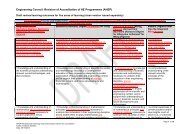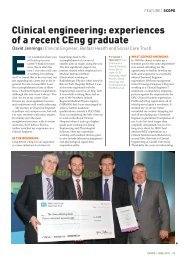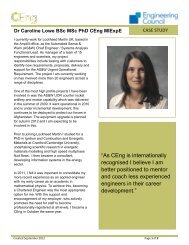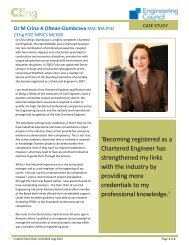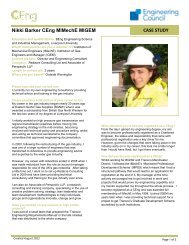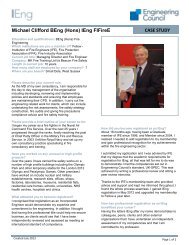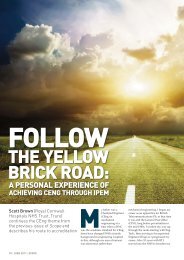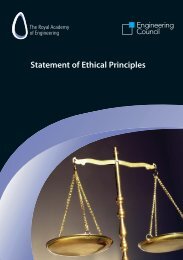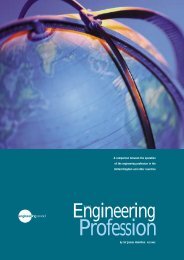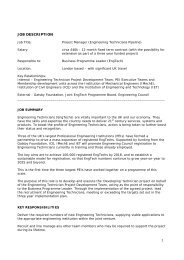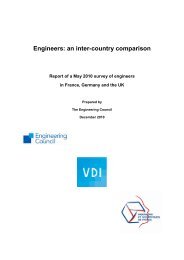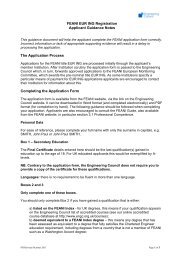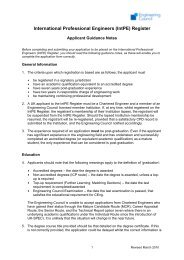An Engine for Change - A Chronicle of the Engineering Council
An Engine for Change - A Chronicle of the Engineering Council
An Engine for Change - A Chronicle of the Engineering Council
You also want an ePaper? Increase the reach of your titles
YUMPU automatically turns print PDFs into web optimized ePapers that Google loves.
1996-1998: THE RUDGE YEARS 131“establishment” body within so many Institutions, who <strong>of</strong>ten did not understand <strong>the</strong>ir ownqualification scheme and certainly had little understanding <strong>of</strong> <strong>the</strong> EngC and remainedsuspicious about what it was up to.”EngC Examinations<strong>An</strong> Examinations Working Group reviewed <strong>the</strong> EngC Part 1 examination syllabus in 1996and recommended changes. It was decided in 1997 that <strong>the</strong> EngC examinations would add aPart 3 to meet <strong>the</strong> SARTOR-3 standard – <strong>the</strong> raising <strong>of</strong> exemplifying academic standard fromBEng to MEng. This amounted to an extra year <strong>of</strong> full-time study consisting <strong>of</strong> two fur<strong>the</strong>rpapers from <strong>the</strong> Part 2 (A) list plus one cross-division paper on Advanced <strong>Engine</strong>ering<strong>An</strong>alysis plus a choice <strong>of</strong> one paper from six advanced syllabi plus a project to demonstrateteam work. A Part 1 examination under <strong>the</strong> old syllabus was held finally in November 1998and <strong>the</strong> new syllabuses came into effect in May 1999.Pr<strong>of</strong>essor Alan Bramley writes:“I was involved with <strong>the</strong> <strong>Engine</strong>ering <strong>Council</strong> examinations, and after serving as a Moderator<strong>for</strong> a short while I was appointed as Chairman <strong>of</strong> one <strong>of</strong> its Boards.“The <strong>Engine</strong>ering <strong>Council</strong> examinations were taken throughout <strong>the</strong> world, and as with any<strong>for</strong>mal examination process one had to guard against plagiarism, cheating, etc. Whilst onewould not want to venture into <strong>the</strong> jungle <strong>of</strong> overt in<strong>for</strong>mation about <strong>the</strong> tricks that somepeople got up to, I do think that it was ra<strong>the</strong>r amusing that <strong>the</strong> examinations had to bescheduled to coincide with <strong>the</strong> time changes around <strong>the</strong> world. This, I think resulted in somequite bizarre arrangements whereby people were taking examinations at odd hours <strong>of</strong> <strong>the</strong> dayand night. Brian Millicent had it all worked out in some detail. The interesting thing aboutthis was <strong>the</strong> way in which in<strong>for</strong>mation technology could have been used very effectively totransmit in<strong>for</strong>mation from one location to ano<strong>the</strong>r if this synchronisation process had notbeen embarked upon.”The requirements <strong>for</strong> <strong>the</strong> examination were developed by <strong>the</strong> EngC in line with <strong>the</strong>progressive raising <strong>of</strong> SARTOR standards and hence Institution membership requirements <strong>for</strong>CEng, as we indicated in Chapter 2. Thus by 1998 <strong>the</strong> examination arrangements were:Part 1 Compulsory subjects:Ma<strong>the</strong>matics<strong>Engine</strong>ering Materials<strong>Engine</strong>ering Science<strong>Engine</strong>ering Perspectives and SkillsOptional Subjects (2 from): Mechanical and Structural <strong>Engine</strong>eringThermodynamic, Fluid and Process <strong>Engine</strong>eringElectrical and Electronic <strong>Engine</strong>eringS<strong>of</strong>tware and In<strong>for</strong>mation Systems <strong>Engine</strong>eringPart 2 (A)Part 2 (B)5 three-hour written examination papers chosen from a list <strong>of</strong> 27 that coveredall <strong>the</strong> main branches <strong>of</strong> hardware and s<strong>of</strong>tware engineering.A single subject ‘The <strong>Engine</strong>er in Society’ which was compulsory.© <strong>Engine</strong>ering <strong>Council</strong> UK 2004



